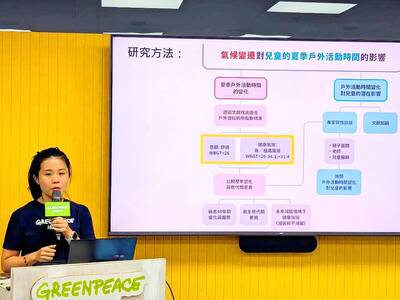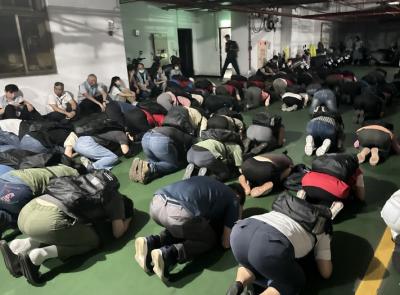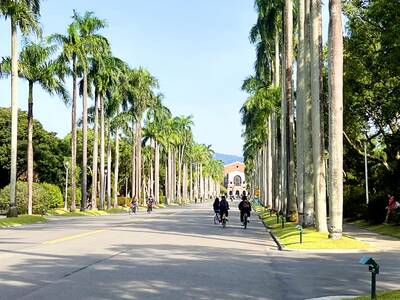Hiring ghostwriters to finish research papers, theses or dissertations has become a widespread phenomenon at Taiwanese universities, legislators said. They yesterday urged the Ministry of Education to come up with solutions to what they say is a growing problem.
"The ghostwriting of theses or dissertations has caused great damage to the quality of higher education. The [ministry] should take action to stop such a trend," said Democratic Progressive Party (DPP) Legislator Huang Wei-cher (
During a press conference held to raise awareness about ghostwriting, Huang and three other DPP legislators, including Cheng Yun-peng (鄭運鵬), Eva Hsieh (謝欣霓) and Winston Dang (陳重信), invited a graduate student and ministry officials to talk about the problem.
According to Hsieh, the ghostwriting of academic papers makes evident the lack of a thesis or dissertation review system at the nation's colleges and universities.
"Our institutes of higher learning should put more emphasis on oral exams and review of a student's academic performance," Hsieh said.
A Google.com search of college Bulletin Board System sites displayed at the press conference showed that information about thesis ghostwriting services or ghostwriter advertisements were easy to come by on the Internet.
"I have friends who ghostwrote theses or dissertations for other students or hire people to write their papers. [Ghostwriting] is becoming popular, and you can find everything about ghostwriting easily online," said the graduate student who wished to remain anonymous.
According to statistics from the ministry, the number of graduate schools has grown from 623 to 2,215 between 1994 and 2003. The quality of higher education, however, failed to keep pace with the growing number of school, the legislators said.
Responding to the criticism, Ma Hsiang-ping (
Since ghostwriting is considered cheating, students who hire someone to ghostwrite for them would be punished with expulsion, Ma said.
"In addition, we will ask colleges and universities to tighten their academic review system to prevent ghostwriting from taking place," Ma added.
According to the research done by the legislators, ghostwriting is popular among students in the liberal arts and business schools.
"Besides focusing more on oral examinations in the review process, replacing traditional dissertations with creative projects, such as performances or displays, could be an alternative to assessing a student's academic achievement," Cheng said.

The government should improve children’s outdoor spaces and accelerate carbon reduction programs, as the risk of heat-related injury due to high summer temperatures rises each year, Greenpeace told a news conference yesterday. Greenpeace examined summer temperatures in Taipei, New Taipei City, Taoyuan, Hsinchu City, Taichung, Tainan and Kaohsiung to determine the effects of high temperatures and climate change on children’s outdoor activities, citing data garnered by China Medical University, which defines a wet-bulb globe temperature (WBGT) of 29°C or higher as posing the risk of heat-related injury. According to the Central Weather Administration, WBGT, commonly referred to as the heat index, estimates

The Taipei Department of Health’s latest inspection of fresh fruit and vegetables sold in local markets revealed a 25 percent failure rate, with most contraventions involving excessive pesticide residues, while two durians were also found to contain heavy metal cadmium at levels exceeding safety limits. Health Food and Drug Division Director Lin Kuan-chen (林冠蓁) yesterday said the agency routinely conducts inspections of fresh produce sold at traditional markets, supermarkets, hypermarkets, retail outlets and restaurants, testing for pesticide residues and other harmful substances. In its most recent inspection, conducted in May, the department randomly collected 52 samples from various locations, with testing showing

Taipei and other northern cities are to host air-raid drills from 1:30pm to 2pm tomorrow as part of urban resilience drills held alongside the Han Kuang exercises, Taiwan’s largest annual military exercises. Taipei, New Taipei City, Keelung, Taoyuan, Yilan County, Hsinchu City and Hsinchu County are to hold the annual Wanan air defense exercise tomorrow, following similar drills held in central and southern Taiwan yesterday and today respectively. The Taipei Mass Rapid Transit (MRT) and Maokong Gondola are to run as usual, although stations and passenger parking lots would have an “entry only, no exit” policy once air raid sirens sound, Taipei

Taipei placed 14th in the Quacquarelli Symonds (QS) Best Student Cities 2026 list, its highest ever, according to results released yesterday. With an overall score of 89.1, the city climbed 12 places from the previous year, surpassing its previous best ranking of 17th in 2019. Taipei is “one of Asia’s leading higher-education hubs,” with strong employer activity scores and students “enjoying their experience of the city and often keen to stay after graduation,” a QS staff writer said. In addition to Taipei, Hsinchu (71st), Tainan (92nd), Taichung (113th) and Taoyuan (130th) also made QS’ list of the top 150 student cities. Hsinchu showed the